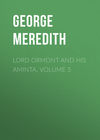Читать книгу: «Lord Ormont and His Aminta. Volume 5»
CHAPTER XXIV
LOVERS MATED
He was benevolently martial, to the extent of paternal, in thinking his girl, of whom he deigned to think now as his countess, pardonably foolish. Woman for woman, she was of a pattern superior to the world's ordinary, and might run the world's elect a race. But she was pitifully woman-like in her increase of dissatisfaction with the more she got. Women are happier enslaved. Men, too, if their despot is an Ormont. Colonel of his regiment, he proved that: his men would follow him anywhere, do anything. Grand old days, before he was condemned by one knows not what extraordinary round of circumstances to cogitate on women as fluids, and how to cut channels for them, that they may course along in the direction good for them, imagining it their pretty wanton will to go that way! Napoleon's treatment of women is excellent example. Peterborough's can be defended.
His Aminta could not reason. She nursed a rancour on account of the blow she drew on herself at Steignton, and she declined consolation in her being pardoned. The reconcilement evidently was proposed as a finale of one of the detestable feminine storms enveloping men weak enough to let themselves be dragged through a scene for the sake of domestic tranquillity.
A remarkable exhibition of Aminta the woman was, her entire change of front since he had taken her spousal chill. Formerly she was passive, merely stately, the chiselled grande dame, deferential in her bearing and speech, even when argumentative and having an opinion to plant. She had always the independent eye and step; she now had the tongue of the graceful and native great lady, fitted to rule her circle and hold her place beside the proudest of the Ormonts. She bore well the small shuffle with her jewel-box—held herself gallantly. There had been no female feignings either, affected misapprehensions, gapy ignorances, and snaky subterfuges, and the like, familiar to men who have the gentle twister in grip. Straight on the line of the thing to be seen she flew, and struck on it; and that is a woman's martial action. He would right heartily have called her comrade, if he had been active himself. A warrior pulled off his horse, to sit in a chair and contemplate the minute evolutions of the sex is pettish with his part in such battle- fields at the stage beyond amusement.
Seen swimming, she charmed him. Abstract views of a woman summon opposite advocates: one can never say positively, That is she! But the visible fair form of a woman is hereditary queen of us. We have none of your pleadings and counter-pleadings and judicial summaries to obstruct a ravenous loyalty. My lord beheld Aminta take her three quick steps on the plank, and spring and dive and ascend, shaking the ends of her bound black locks; and away she went with shut mouth and broad stroke of her arms into the sunny early morning river; brave to see, although he had to flick a bee of a question, why he enjoyed the privilege of seeing, and was not beside her. The only answer confessed to a distaste for all exercise once pleasurable.
She and her little friend boated or strolled through the meadows during the day; he fished. When he and Aminta rode out for the hour before dinner, she seemed pleased. She was amicable, conversable, all that was agreeable as a woman, and she was the chillest of wives. My lord's observations and reflections came to one conclusion: she pricked and challenged him to lead up to her desired stormy scene. He met her and meant to vanquish her with the dominating patience Charlotte had found too much for her: women cannot stand against it.
To be patient in contention with women, however, one must have a continuous and an exclusive occupation; and the tax it lays on us conduces usually to impatience with men. My lord did not directly connect Aminta's chillness and Morsfield's impudence; yet the sensation roused by his Aminta participated in the desire to punish Morsfield speedily. Without wishing for a duel, he was moved by the social sanction it had to consider whether green youths and women might not think a grey head had delayed it too long. The practice of the duel begot the peculiar animal logic of the nobler savage, which tends to magnify an offence in the ratio of our vanity, and hunger for a blood that is not demanded by the appetite. Moreover, a waning practice, in disfavour with the new generation, will be commended to the conservative barbarian, as partaking of the wisdom of his fathers. Further, too, we may have grown slothful, fallen to moodiness, done excess of service to Omphale, our tyrant lady of the glow and the chill; and then undoubtedly the duel braces.
He left Aminta for London, submissive to the terms of intimacy dictated by her demeanour, his unacknowledged seniority rendering their harshness less hard to endure. She had not gratified him with a display of her person in the glitter of the Ormont jewels; and since he was, under common conditions, a speechless man, his ineptitude for amorous remonstrances precipitated him upon deeds, that he might offer additional proofs of his esteem and the assurance of her established position as his countess. He proposed to engage Lady Charlotte in a conflict severer than the foregoing, until he brought her to pay the ceremonial visit to her sister-in-law. The count of time for this final trial of his masterfulness he calculated at a week. It would be an occupation, miserable occupation though it was. He hailed the prospect of chastising Morsfield, for a proof that his tussels with women, prolonged study of their tricks, manoeuvrings and outwittings of them, had not emasculated him.
Aminta willingly promised to write from day to day. Her senses had his absence insured to them by her anticipation of the task. She did not conceive it would be so ponderous a task. What to write to him when nothing occurred! Nothing did occur, unless the arrival of Mr. Weyburn was to be named an event. She alluded to it: 'Mr. Weyburn has come, expecting to find you here. The dispatch-box is here. Is he to await you?'
That innocent little question was a day gained.
One day of boating on the upper reaches of the pastoral river, and walks in woods and golden meadows, was felicity fallen on earth, the ripe fruit of dreams. A dread surrounded it, as a belt, not shadowing the horizon; and she clasped it to her heart the more passionately, like a mother her rosy infant, which a dark world threatens and the universal fate.
Love, as it will be at her June of life, was teaching her to know the good and bad of herself. Women, educated to embrace principles through their timidity and their pudency, discover, amazed, that these are not lasting qualities under love's influence. The blushes and the fears take flight. The principles depend much on the beloved. Is he a man whose contact with the world has given him understanding of life's laws, and can hold him firm to the right course in the strain and whirling of a torrent, they cling to him, deeply they worship. And if they tempt him, it is not advisedly done. Nature and love are busy in conjunction. The timidities and pudencies have flown; they may hover, they are not present. You deplore it, you must not blame; you have educated them so. Muscular principles are sown only out in the world; and, on the whole, with all their errors, the worldly men are the truest as well as the bravest of men. Her faith in his guidance was equal to her dependence. The retrospect of a recent journey told her how he had been tried.
She could gaze tenderly, betray her heart, and be certain of safety. Can wine match that for joy? She had no schemes, no hopes, but simply the desire to bestow, the capacity to believe. Any wish to be enfolded by him was shapeless and unlighted, unborn; though now and again for some chance word or undefined thought she surprised the strange tenant of her breast at an incomprehensibly faster beat, and knew it for her own and not her own, the familiar the stranger—an utter stranger, as one who had snared her in a wreath and was pulling her off her feet.
She was not so guileless at the thought of little Selina Collett here, and of Selina as the letter-bearer of old; and the marvel that Matey and Browny and Selina were together after all! Was it not a kind of summons to her to call him Matey just once, only once, in play? She burned and ached to do it. She might have taxed her ingenuity successfully to induce little Selina to the boldness of calling him Matey—and she then repeating it, as the woman who revived with a meditative effort recollections of the girl. Ah, frightful hypocrite! Thoughts of the pleasure of his name aloud on her lips in his hearing dissolved through her veins, and were met by Matthew Weyburn's open face, before which hypocrisy stood rent and stripped. She preferred the calmer, the truer pleasure of seeing him modestly take lessons in the nomenclature of weeds, herbs, grasses, by hedge and ditch. Selina could instruct him as well in entomology, but he knew better the Swiss, Tyrolese, and Italian valley-homes of beetle and butterfly species. Their simple talk was a cool zephyr fanning Aminta.
The suggestion to unite the two came to her, of course, but their physical disparity denied her that chance to settle her own difficulty, and a whisper of one physically the match for him punished her. In stature, in healthfulness, they were equals, perhaps: not morally or intellectually. And she could claim headship of him on one little point confided to her by his mother, who was bearing him, and startled by the boom of guns under her pillow, when her husband fronted the enemy: Matthew Weyburn, the fencer, boxer, cricketer, hunter, all things manly, rather shrank from firearms—at least, one saw him put on a screw to manipulate them. In danger—among brigands or mutineers, for example— she could stand by him and prove herself his mate. Intellectually, morally, she had to bow humbly. Nor had she, nor could she do more than lean on and catch example from his prompt spiritual valiancy. It shone out from him, and a crisis fulfilled the promise. Who could be his mate for cheerful courage, for skill, the ready mind, easy adroitness, and for self-command? To imitate was a woman's utmost.
Matthew Weyburn appeared the very Matey of the first of May cricketing day among Cuper's boys the next morning, when seen pacing down the garden-walk. He wore his white trousers of that happiest of old days— the 'white ducks' Aminta and Selina remembered. Selina beamed. 'Yes, he did; he always wore them; but now it's a frock-coat instead of a jacket.'
'But now he will be a master instead of a schoolboy,' said Aminta.
'Let us hope he will prosper.'
'He gives me the idea of a man who must succeed,' Selina said; and she was patted, rallied, asked how she had the idea, and kissed; Aminta saying she fancied it might be thought, for he looked so confident.
'Only not what the boys used to call "cocky,"' said Selina. 'He won't be contemptuous of those he outstrips.'
'His choice of the schoolmaster's profession points to a modesty in him, does it not, little woman?'
'He made me tell him, while you were writing your letters yesterday, all about my brother and his prospects.'
'Yes, that is like him. And I must hear of your brother, "little
Collett." Don't forget, Sely, little Collett was our postman.'
The Countess of Ormont's humorous reference to the circumstance passed with Selina for a sign of a poetic love of the past, and a present social elevation that allowed her to review it impassively. She admired the great lady and good friend who could really be interested in the fortunes of a mere schoolmaster and a merchant's clerk. To her astonishment, by some agency beyond her fathoming, she found herself, and hardly for her own pleasure, pushing the young schoolmaster animatedly to have an account of his aims in the establishment of the foreign school.
Weyburn smiled. He set a short look at Aminta; and she, conscious of her detected diplomacy, had an inward shiver, mixed of the fascination and repugnance felt by a woman who knows that under one man's eyes her character is naked and anatomized. Her character?—her soul. He held it in hand and probed it mercifully. She had felt the sweet sting again and again, and had shrunk from him, and had crawled to him. The love of him made it all fascination. How did he learn to read at any moment right to the soul of a woman? Did experience teach him, or sentimental sympathy? He was too young, he was too manly. It must be because of his being in heart and mind the brother to the sister with women.
Thames played round them on his pastoral pipes. Bee-note and woodside blackbird and meadow cow, and the fish of the silver rolling rings, composed the leap of the music.
She gave her mind to his voice, following whither it went; half was in air, higher than the swallow's, exalting him.
How is it he is the brother of women? They are sisters for him because he is neither sentimentalist nor devourer. He will not flatter to feed on them. The one he chooses, she will know love. There are women who go through life not knowing love. They are inanimate automatic machines, who lay them down at last, inquiring wherefore they were caused to move. She is not of that sad flock. She will be mated; she will have the right to call him Matey. A certain Browny called him Matey. She lived and died. A certain woman apes Browny's features and inherits her passion, but has forfeited her rights. Were she, under happiest conditions, to put her hand in his, shame would burn her. For he is just—he is Justice; and a woman bringing him less than his due, she must be a creature of the slime!
This was the shadowy sentiment that made the wall of division between them. There was no other. Lord Ormont had struck to fragments that barrier of the conventional oath and ceremonial union. He was unjust— he was Injustice. The weak may be wedded, they cannot be married; to Injustice. And if we have the world for the buttress of injustice, then is Nature the flaring rebel; there is no fixed order possible. Laws are necessary instruments of the majority; but when they grind the sane human being to dust for their maintenance, their enthronement is the rule of the savage's old deity, sniffing blood-sacrifice. There cannot be a based society upon such conditions. An immolation of the naturally constituted individual arrests the general expansion to which we step, decivilizes more, and is more impious to the God in man, than temporary revelries of a licence that Nature soon checks.
Arrows of thoughts resembling these shot over the half of Aminta's mind not listening. Her lover's head was active on the same theme while he spoke. They converged to it from looks crossing or catching profiles, or from tones, from a motion of hand, from a chance word. Insomuch that the third person present was kept unobservant only by her studious and humble speculations on the young schoolmaster's grand project to bring the nationalities together, and teach Old England to the Continent—the Continent to Old England: our healthy games, our scorn of the lie, manliness; their intellectual valour, diligence, considerate manners.
'Just to name a few of the things for interchange,' said Weyburn. 'As to method, we shall be their disciples. But I look forward to our fellows getting the lead. No hurry. Why will they? you ask in petto. Well, they 're emulous, and they take a thrashing kindly. That 's the way to learn a lesson. I 've seen our fellows beaten and beaten—never the courage beaten out of them. In the end, they won and kept the field. They have a lot to learn—principally not to be afraid of ideas. They lose heaps of time before they can feel at home with ideas. They call themselves practical for having an addiction to the palpable. It is a pretty wreath they clap on their deficiencies. Practical dogs are for bones, horses for corn. I want the practical Englishman to settle his muzzle in a nosebag of ideas. When he has once got hold of them, he makes good stuff of them. On the Continent ideas have wings and pay visits. Here, they're stay-at-home. Then I want our fellows to have the habit of speaking from the chest. They shall return to England with the whoop of the mountains in them and ready to jump out. They shall have an Achillean roar; and they shall sing by second nature. Don't fear: they'll give double for anything they take. I've known Italians, to whom an Englishman's honesty of mind and dealing was one of the dreams of a better humanity they had put in a box. Frenchmen, too, who, when they came to know us, were astonished at their epithet of perfide, and loved us.'
'Emile,' said Aminta. 'You remember Emile, Selina: the dear little
French boy at Mr. Cuper's?'
'Oh, I do,' Selina responded.
'He will work with Mr. Weyburn in Switzerland.'
'Oh, that will be nice!' the girl exclaimed.
Aminta squeezed Selina's hand. A shower of tears clouded her eyes. She chose to fancy it was because of her envy of the modest, busy, peaceful girl, who envied none. Conquers also sincerity in the sincerest. She was vexed with her full breast, and had as little command of her thoughts as of her feelings.
'Mr. Weyburn has ideas for the education of girls too,' she said.
'There's the task,' said he. 'It's to separate them as little as possible. All the—passez-moi le mot—devilry between the sexes begins at their separation. They 're foreigners when they meet; and their alliances are not always binding. The chief object in life, if happiness be the aim, and the growing better than we are, is to teach men and women how to be one; for, if they 're not, then each is a morsel for the other to prey on. Lady Charlotte Eglett's view is, that the greater number of them on both sides hate one another.'
'Hate!' exclaimed Selina; and Aminta said: 'Is Lady Charlotte Eglett an authority?'
'She has observed, and she thinks. She has in the abstract the justest of minds: and that is the curious point about her. But one may say they are trained at present to be hostile. Some of them fall in love and strike a truce, and still they are foreigners. They have not the same standard of honour. They might have it from an education in common.'
'But there must be also a lady to govern the girls?' Selina interposed.
'Ah, yes; she is not yet found!'
'Would it increase their mutual respect?—or show of respect, if you like?' said Aminta, with his last remark at work as the shattering bell of a city's insurrection in her breast.
'In time, under management; catching and grouping them young. A boy who sees a girl do what he can't, and would like to do, won't take refuge in his muscular superiority—which, by the way, would be lessened.'
'You suppose their capacities are equal?'
'Things are not equal. I suppose their excellencies to make a pretty nearly equal sum in the end. But we 're not weighing them each. The question concerns the advantage of both.'
'That seems just!'
Aminta threw no voice into the word 'just.' It was the word of the heavens assuaging earth's thirst, and she was earth to him. Her soul yearned to the man whose mind conceived it.
She said to Selina: 'We must plan an expedition next year or the year after, and see how the school progresses.'
All three smiled; and Selina touched and held Aminta's hand shyly.
Visions of the unseen Switzerland awed her.
Weyburn named the Spring holiday time, the season of the flowering Alpine robes. He promised welcome, pressed for a promise of the visit. Warmly it was given. 'We will; we will indeed!'
'I shall look forward,' he said.
There was nothing else for him or for her, except to doat on the passing minute that slipped when seized. The looking forward turned them to the looking back at the point they had flown from, and yielded a momentary pleasure, enough to stamp some section of a picture on their memories, which was not the burning now Love lives for, in the clasp, if but of hands. Desire of it destroyed it. They swung to the future, swung to the present it made the past, sensible to the quick of the now they could not hold. They were lovers. Divided lovers in presence, they thought and they felt in pieces. Feelings and thoughts were forbidden to speech. She dared look the very little of her heart's fulness, without the disloyalty it would have been in him to let a small peep of his heart be seen. While her hand was not clasped she could look tenderly, and her fettered state, her sense of unworthiness muffled in the deeps, would keep her from the loosening to passion.
He who read through her lustrous, transiently dwelling eyes had not that security. His part, besides the watch over the spring of his hot blood, was to combat a host, insidious among which was unreason calling her Browny, urging him to take his own, to snatch her from a possessor who forfeited by undervaluing her. This was the truth in a better-ordered world: she belonged to the man who could help her to grow and to do her work. But in the world we have around us, it was the distorted truth: and keeping passion down, he was able to wish her such happiness as pertained to safety from shipwreck, and for himself, that he might continue to walk in the ranks of the sober citizens.
Oh, true and right, but she was gloriously beautiful! Day by day she surpassed the wondrous Browny of old days. All women were eclipsed by her. She was that fire in the night which lights the night and draws the night to look at it. And more: this queen of women was beginning to have a mind at work. One saw already the sprouting of a mind repressed. She had a distinct ability; the good ambition to use her qualities. She needed life and air—that is, comprehension of her, encouragement, the companion mate. With what strength would she now endow him! The pride in the sharp imagination of possessing her whispered a boast of the strength her mate would have from her. His need and her need rushed together somewhere down the skies. They could not, he argued, be separated eternally.
He had to leave her. Selina, shocked at a boldness she could not understand in herself, begged him to stay and tell her of Switzerland and Alpine flowers and herbs, and the valleys for the gold beetle and the Apollo butterfly. Aminta hinted that Lord Ormont might expect to find him there, if he came the next morning; but she would not try to persuade, and left the decision with him, loving him for the pain he inflicted by going.
Why, indeed, should he stay? Both could ask; they were one in asking. Anguish balanced pleasure in them both. The day of the pleasure was heaven to remember, heaven to hope for; not so heavenly to pray for. The praying for it, each knew, implored their joint will to decree the perilous blessing. A shadowy sentiment of duty and rectitude, born of what they had suffered, hung between them and the prayer for a renewal, that would renew the tempting they were conscious of when the sweet, the strained, throbbing day was over. They could hope for chance to renew it, and then they would be irresponsible. Then they would think and wish discreetly, so as to have it a happiness untainted. In refusing now to take another day or pray for it, they deserved that chance should grant it.





















